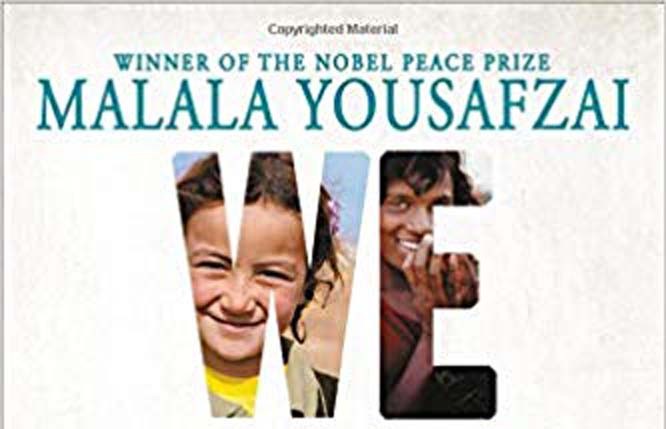
In her second book, Malala tells the deeply personal stories of displacement and disruption that were lived by refugee girls from all around the world

World’s youngest Nobel Laureate Malala Yousafzai released her second book We Are Displaced: My Journey and Stories from Refugee Girls Around the World in January this year. I wanted to read it but I did not know when it would be available in Pakistan. I saw it at Karachi airport for the first time two months ago. I had an hour in my flight. I picked the book and sat in the waiting area with my regular latte. I could read one story only in that limited time but it was promising enough to make me hunt for it in Lahore later.
I finally found it two weeks later in a bookshop in Lahore. This time I sat there on a stool to read the remaining book.
I prefer reading books in bookshops and libraries for two reasons. First, these places provide an environment comfortable enough for reading and pondering and it’s better to socialise in the real world than the virtual world. Second, one can read these books there which come with a heavy price making it a little out of budget for people like me who are facing paycuts and layoffs.
We Are Displaced comes at a very right time when human rights organisations are trying to bring the attention of the world toward the biggest humanitarian crisis of our time: war and the resulting refugees. Malala has put her efforts in this cause by telling stories of young refugee girls who were displaced to a place different from their country of origin. The book explains how this forced displacement affected their life and their struggle to start a new life and adjustment in a new education system.
According to the United Nations High Commission for Refugees (UNHCR), 70.8 million people have been forcibly displaced worldwide. This figure includes refugees, internally displaced persons, and asylum seekers. Majority of them are children and most are girls. 57 percent of UNHCR refugees come from Syria, Afghanistan and South Sudan. About 37,000 people are forced to flee their homes per day because of conflict and persecution. These refugees face several challenges starting from the moment they decide to leave their country of origin to the present day in their host country. These challenges include physical violence, abuse, denial of basic human rights, isolation, sexual abuse and much more.
Malala wrote her first book, I am Malala in 2013 which was mostly about her home town, her family, their traditions, her school, the situation in post-Taliban Swat, the attack and her life after the attack. I especially liked the chapter in which she tells what happened after she opened her eyes in Queen Elizabeth Hospital, located in the United Kingdom (UK). That was her story. Her new book tells that she was not the only one who was displaced. There are millions of people who were and are forcibly displaced. Unfortunately, a majority of them are children.
We Are Displaced opens with her own story of displacement. After she was taken to the United Kingdom for medical treatment, she could not return to Pakistan for six years. She came back in March last year for a few days. During this short trip, she visited her valley with her family, went to her house and met friends and relatives she had to leave behind. She documents her feelings about that moment in the first chapter of her second book.
The book then continues with stories of refugee girls from Colombia, Syria, the Democratic Republic of Congo and around the world -- many of whom Malala has met through her campaign for girls’ education. These girls share their stories of struggle, triumph, and hope.
It tells stories of two sisters Zainab and Sabreen who first moved from Yemen to Egypt and then to two different countries. They were separated when Zainab was issued American visa but Sabreen was declined. Zainab left with a heavy heart, leaving Sabreen behind in Egypt. Sabreen, not knowing what to do next, crossed the Mediterranean Sea illegally to reach Italy where she found a life for her.
Through these stories, Malala not only highlights how displacement disconnected these girls from schools but also highlights the political, social and economic factors which affected their whole journey -- the diplomatic policies, illegal practices, social perception of refugees and political approach towards them.
It also tells the story of Muzoon whose father stopped talking to her because she wanted to go to school and he wanted her to get married instead.
Similarly, this book has a story of Najla and many other girls who fought and suffered to have their access to school and books. This book is no less than an energy booster for people who do not know where to find hope and motivation to keep going on.
This is definitely a book which must be made a part of the curriculum in some manner globally. It should also be available in libraries where young kids and adults of all age groups can read it in study circles to know what these girls and many others go through when they become refugees. None of them wanted to become the next Einstein or Steve Jobs. They just wanted to get an education which is a basic human right. But they were denied that.
Malala has done her job. Now, it is our turn to bring change and make education accessible for all -- and that is only possible by raising our voice and collective work.
We Are Displaced My Journey and Stories from Refugee Girls Around the World
Author: Malala Yousafzai
Publisher: Little Brown USA
Pages: 224 (Hardback)
Price: 2,295